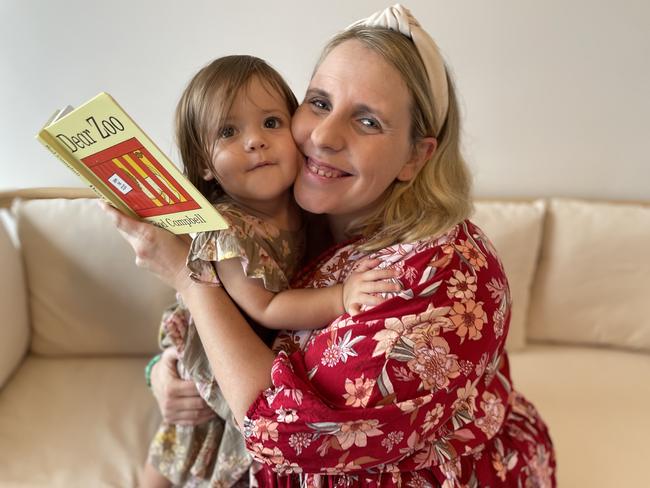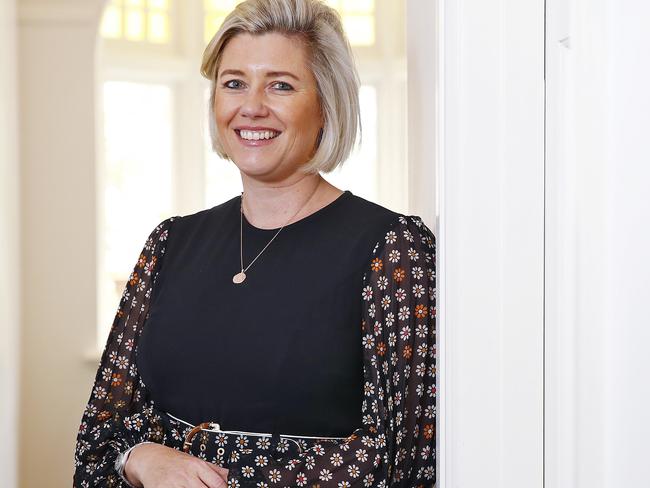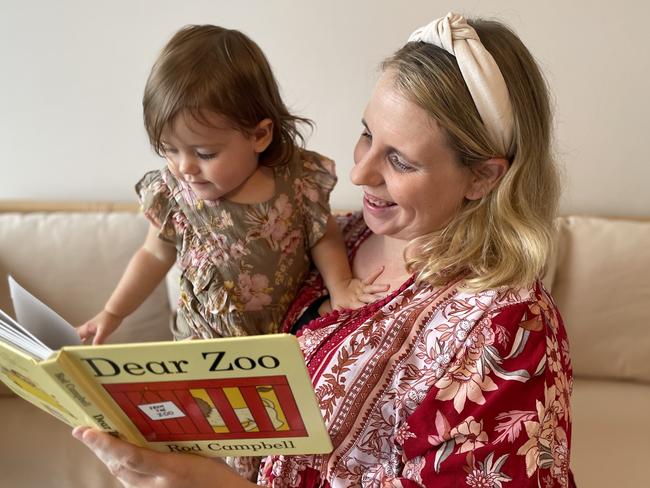New parents are seeking out help in record numbers as a result of Covid
Having a baby is challenging enough but add the mental health effects of isolation due to Covid and Australian parents are enduring a post-natal pandemic of their own. But help is at hand.
NSW
Don't miss out on the headlines from NSW. Followed categories will be added to My News.
Panic attacks. No sleep. Barely being able to leave the house. Anxiety so severe that it seems impossible to breathe.
That has been the reality many new mums like Tammy Hewitt over the past two years.
Having a baby is challenging enough. Add the mental health effects of the isolation and uncertainty created by a two-year long pandemic, and Australian parents are enduring a post-natal pandemic of their own.
Help is at hand but with some sufferers too anxious to attend a doctor’s appointment, the alarming numbers of parents seeking help are set to rise.
New figures from the Gidget Foundation which provides support to parents with post natal anxiety and depression show that February was their biggest month ever, with 1593 consultations — an 85 per cent increase on 12 months before.
Between November and February alone they have seen a 72 per cent increase in services. Importantly, they’ve managed to slash waitlists that last year were up to six months long, a huge step in the right direction, said Hewitt, whose daughter Indie was born mid-pandemic in October of 2020.
“Even though I was vomiting all day, every day, I handled pregnancy pretty well but the deep anxiety hit when she was born,” said the Killcare 38-year-old, who suffered severe morning sickness, or hyperemesis, for her whole pregnancy.

“I had issues feeding Indie. She didn’t have a sucking reflex so she wasn’t drinking for the first two days so unfortunately I had to give her formula.
“I think straight away that heightened my anxiety. It just skyrocketed because she was screaming because she wouldn’t sleep, because she wasn’t feeding.
“I just lost all confidence and it became a cycle of anxiety, a bit of a spiral.”
Hewitt only got through the day by watching the clock tick to 7pm so she could take a sleeping tablet to quieten the noise.
“I would count down the minutes, that’s how bad it was. It was just so difficult,” she said.
“The things you expect from motherhood — baby showers, having visitors at the hospital, mothers’ group — the pandemic stopped all that. Indie hasn’t even started swimming lessons yet.
“When I would have panic attacks my heart would race so much it was like my heart was going to come out of my chest.
“I got extremely clammy and felt quite faint and very unwell, sweating profusely.
“I’d get a lump in my throat and would struggle to swallow and I felt it would stop me breathing, and then you panic over that.”
Seeking help changed Hewitt’s mindset, and tools such as mindfulness apps, talking about her issues and medication supported her to minimise the anxiety that was taking over her life. Now a life coach for women, Hewitt said reducing wait times for sufferers needing help was a vital part of the mental health puzzle for parents. She waited 12 weeks to seek help, and says being told there was still a long wait from that moment was heartbreaking.

“I just honestly feel for the parents, for the new mums right now,” she said.
“We need to break down the stigmas to empower parents to feel strong enough to ask for help.
“It’s OK not to be OK, and it’s OK to say you need help.”
To ease pressure on the expanding waitlist and help as many expectant and new parents as possible, the Gidget Foundation introduced its Pandemic Initiative with the help of government funding of $2.6 million over two years.
The initiative was a financial incentive offered to clinicians to take on more hours with the Foundation – with more clinicians available they were able to increase service delivery and offer more appointments, bringing wait lists down.
At the same time, the clinical workforce was also increasing as a result of their innovative clinical education and supervision program, which was designed to grow the specialist workforce.
And it’s working. When the initiative was first introduced, the number of people on the waitlist was 241, with a wait time peaking at up to six months. As of February this year, that was down 80 per cent. Over the three months that the Pandemic Initiative has been running, 1260 appointments have been held, with 407 new clients booked in and taken off the waiting list.
CEO of Gidget Foundation Australia, Arabella Gibson, said symptoms being reported are as bad as post-partum psychosis, as well as OCD and severe anxiety and affected not only new parents, but also those struggling with fertility issues or dealing with the grief of stillbirth.

“I think we definitely are talking about our mental health more than ever before, and the stigma related to it is ever so slowly reducing,” she said.
“But there’s still a lot of fear and shame and denial in expectant and new parents about what they’re feeling because it’s meant to be this joyful, fabulous, wonderful time. In fact, it’s incredibly challenging.
“Add the current circumstances into the mix and it’s been even harder because people haven’t had those traditional support mechanisms around them.
“From our perspective, what we have seen is an incredible demand for services in the mental health space.”
She said peri-natal mental health had traditionally been underfunded right across the country, but governments were starting to identify that supporting families in the early years helps sufferers recover and go on to live happy and fulfilled lives. A result that could only benefit the next generation.
“We know that there is an intergenerational impact of peri-natal depression and anxiety, so if we can get in there while it’s still in its infancy stages and address support to parents who might be feeling these particular types of illnesses, then we can really make a significant difference to that whole family, for the rest of their lives,” she said.
The Foundation has launched its Have A Yarn initiative, encouraging people to come together, have a chat over a cuppa and knit, crochet or craft to improve mental health and mindfulness and help new parents recreate the communities they have been missing.
Some have been too worried to leave the house for fear of themselves or their babies contracting Covid — a factor leading to ‘Covid lag’ in addressing mental health issues.
“The Covid lag is where people are getting diagnosed quite late in the piece because it’s taken them a while to feel comfortable enough to speak to someone about it.
“So there has been a huge demand, but it’s only going to increase over the next few years.”

Mental Health Minister Bronnie Taylor was a registered nurse for 20 years before going into parliament, and said early intervention by services such as the Gidget Foundation not only changed lives, but saved them.
“One of the things that set me on the trajectory for being such an advocate for this, was when I first came into parliament and Tresillian came and spoke to us in our party room and I remembered what it felt like to come from a small community.
“I felt quite vulnerable myself after my second daughter, and what a huge difference the early childhood nurse made to me.
“We used to have a bush clinic that we would go to and I would bring in Holly, my youngest. And I know that absolutely changed my enjoyment as a mother, but also for my family, because it made me a better mother, it taught me the strategies to deal with the frustrations and the feelings that I was experiencing with her.
“We (usually) get so much support from mothers’ groups and talking to other mothers or being able to have your mum come in. I remember handing one of my daughters to my mum and she said ‘off you go’ and I felt like I had wings.
“No one could do that during Covid, and that has been extremely difficult, so we expected that we would see a rise in peri-natal anxiety, and we have.
“For some people, it might just take one intervention, for others, it will take a lot longer.
“But if we can just get in there and get them through that door and just acknowledge that there’s an issue, you’re halfway to recovery.”
For help, phone The Gidget Foundation on 1300 851 758 or visit gidgetfoundation.org.au
The PANDA National Helpline is available Monday to Friday, 9am-7.30pm on 1300 726 306
For 24 hour crisis support, call Lifeline 13 11 14





